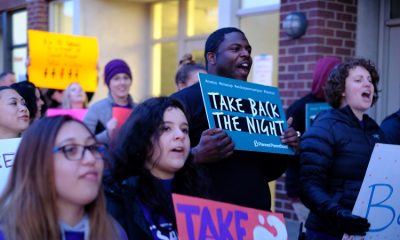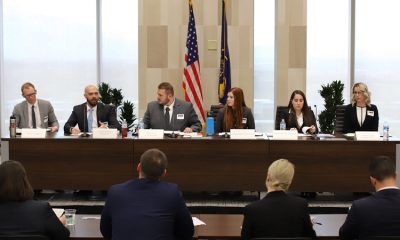U. S. News
Here are the 3 legal cases Trump may have to face once he’s no longer president

WASHINGTON — Pres. Donald Trump has still yet to concede to president-elect Joe Biden nearly three weeks after the 2020 Presidential Election.
Despite the president’s 74-elector and 6 million popular vote deficit to Biden, the Trump campaign continues pursuing legal actions regarding unproven claims of voter fraud.
As these challenges fumble in court and states certify election results, the likelihood that Trump’s presidency is near its end seems greater — but what happens for the 74-year-old once he’s no longer president?
Without the shield of the presidency, Trump may be faced with ongoing legal challenges of his own, Tom Winter for NBC News posited on Sunday.
“He will no longer be able to argue in court that his position as the nation’s chief executive makes him immune to prosecution or protects him from turning over documents and other evidence,” writes Winter. “He will also lose the help of the Department of Justice in making those arguments.”
Manhattan district attorney’s case
This case stems back to 2018, when former Trump lawyer Michael Cohen pleaded guilty to campaign finance violations.
Cohen’s indictment claims he paid porn star Stormy Daniels $130,000 before the 2016 Presidential Election to not reveal her previous alleged affair with Trump. Then, the payment was reportedly buried behind the anonymous label, “Individual-1.”
The Trump Organization is still being investigated by Manhattan DA Cy Vance, and the president’s business could face charges of falsifying records, and insurance and tax fraud.
Cohen has also accused Trump of using two sets of numbers to benefit his business: providing higher values to get loans, and lower numbers to skirt high taxes.
According to NBC, Vance has ordered eight years’ worth of Trump tax documents — with the Supreme Court ultimately ruling last October that Trump was not protected from providing them just because he was president.
Nevertheless, Trump has continued fighting Vance’s subpeona and the Supreme Court will eventually decide what will happen next.
Danny Cevallos, NBC legal analyst, predicts Vance would pursue lesser charges such as tax evasion or falsifying records.
Trump would likely only face financial punishment for those charges, according to Winter.
New York attorney general’s case
A civil case alleges four instances when the Trump Organization inflated or deflated its assets for personal gain, including an attempt to buy the Buffalo Bills football team.
Trump’s son Eric spoke to investigators last month after losing his bid to delay deposition and turning over documents regarding the case.
NY AG Letitia James said back in August:
“For months, the Trump Organization has made baseless claims in an effort to shield evidence from a lawful investigation into its financial dealings. “They have stalled, withheld documents, and instructed witnesses, including Eric Trump, to refuse to answer questions under oath… these questions will be answered and the truth will be uncovered, because no one is above the law.”
Allegations of inappropriate sexual behavior
Various claims from several women that Trump behaved inappropriately — and possibly illegally — with them still linger.
These include a claim by advice columnist E. Jean Carroll, who wrote in a 2019 book that Trump raped her in a department store dressing room 20 years ago. Trump responded by saying Carroll “wasn’t his type” and accused her of trying to get publicity for her book.
Without the shield of the presidency, Trump may have to participate in the lawsuit — by potentially providing a DNA sample or testifying in court.
A former contestant on Trump’s pre-presidency reality show, “The Apprentice,” has also filed suit against Trump in relation to his alleged sexual assault on her.
Summer Zervos says in the lawsuit that Trump grabbed her breast and kissed her without consent. Despite Trump agreeing to testify, his legal teams have been able to delay any further action.
Could he pardon himself?
The possibility that Trump would pardon himself is unlikely, NBC legal analyst and former FBI official Chuck Rosenberg says.
Or it’s at least unlikely that an attempt would be successful.
A memo dating back to Richard Nixon’s 1974 resignation addresses the issue of presidential pardons, when the Justice Department said that “under the fundamental rule that no one may be a judge in his own case, the President cannot pardon himself.”
But the memo has never been challenged in court.
A possible path to a Trump pardon is also explained in the 1974 memo, which explains that by power of the 25th Amendment, the president could say he was unable to perform duties as president — allowing his vice president to become an acting president who could bestow a pardon.
-

 Local News2 weeks ago
Local News2 weeks agoAn organization from Weber State University protests during the yearly Sexual Assault Awareness event
-

 Local News1 week ago
Local News1 week agoUtah libraries celebrate National Library Week
-

 Local News5 days ago
Local News5 days agoThe Jewish community in the area responds to a potential Iranian invasion on Israel
-

 Local News1 week ago
Local News1 week agoWhy Utah might have rumblings for the next five months
-

 Local News2 weeks ago
Local News2 weeks agoUtah law students engage in simulations to understand counterterrorism strategies
-

 Local News2 weeks ago
Local News2 weeks agoThe most recent storm may dump at least one foot of snow in some areas of Utah’s mountains
-

 Local News1 week ago
Local News1 week agoStudent protests against an anti-trans speaker at the University of Utah
-

 Local News1 week ago
Local News1 week agoTransit will be redesigned and expanded by UTA by the potential 2034 Olympics






Leave a Reply